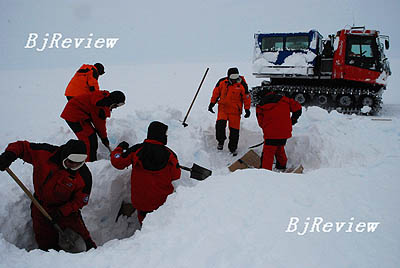| 
No Inflationary Spiral
China will not experience an inflationary spiral this year with 9 to 10 percent gross domestic product (GDP) growth, predicted economist Justin Yifu Lin.
"China's economy growth will maintain a high level this year and an inflationary spiral is not in sight," said Lin, the newly appointed senior vice president and chief economist of the World Bank and a deputy to the 11th National People's Congress.
He said the country's high economic growth is due to "the country's down-to-earth economic polices, which are in the light of the practical situation of China and mobilize the creativity of its people."
"The Chinese Government is very flexible in exercising policies. The current tight monetary policy is a good example," he added.
Curb on Prices
The Chinese Government has asked refined oil sellers not to raise prices amid global oil price rises, in a bid to curb rising inflationary pressure.
Refined oil sellers across the country should follow state-regulated prices. Arbitrary price rises are not allowed, according to a joint statement issued by the National Development and Reform Commission and the Ministry of Commerce on March 4.
The price of crude oil in China is set by the global market, but the refined price is still regulated by the government.
Policymakers are working to determine when to close the gap between the comparatively lower prices of refined oil products in China and the record-setting global price.
Wind Power
South China's Guangdong Province plans to build the nation's largest offshore wind farm, in a bid to quench its power thirst.
The facility, with a sea area coverage of 240 square km, will be co-sponsored by the Lufeng Municipal Government and Guangdong Baolihua New Energy Stock Co. Ltd.
The plan includes an 1.25-million-kw wind farm, an 8 million kw supercritical power plant and a dock construction project.
The facility is expected to "relieve the energy pressure and optimize the energy structure" in the booming province, local government officials said.
China began to work on its second west-to-east natural gas transmission pipeline last month. It will mainly carry natural gas from the natural resource-rich west to coastal Yangtze and Pearl River deltas, the country's two most developed regions.
Jets Are Hot
China's first independently developed commercial regional jet, the ARJ-21, will receive foreign orders this year, said its Chief Designer Wu Guanghui, on March 4.
"The ARJ-21 is highly competitive in its performance in overseas markets," said Wu, a member of the 11th National Committee of the Chinese People's Political Consultative Conference, China's top political advisory body.
He estimated in the coming 20 years world demand for jets with 70 to 100 seats will be at least 3,000, while in the domestic market, demand will be no less than 1,000.
The ARJ-21, short for "Advanced Regional Jet for the 21st Century," features safety and a low price. The first homegrown ARJ-21 jet, with 90 seats, rolled off the production line in Shanghai Aircraft Manufacturing Factory on December 21, 2007.
Pay to Read
Only 30 percent of netizens are willing to pay for e-reading, but more than half agree it is reasonable to charge money for web information, a nationwide survey found.
Of the 30 percent of people who would pay to read, one third said they would pay according to the amount downloaded, another third would choose a lump sum, and the rest would pay by the month or year.
Paying through a cell phone bill or registered account were two popular payment methods for netizens, although some would rather pay by credit card or transfer payments through a bank account.
Of the 66 percent of netizens who agreed on some reasonable charges or held neutral opinions, most agreed the reasonable way to charge was based on the download amount. | 